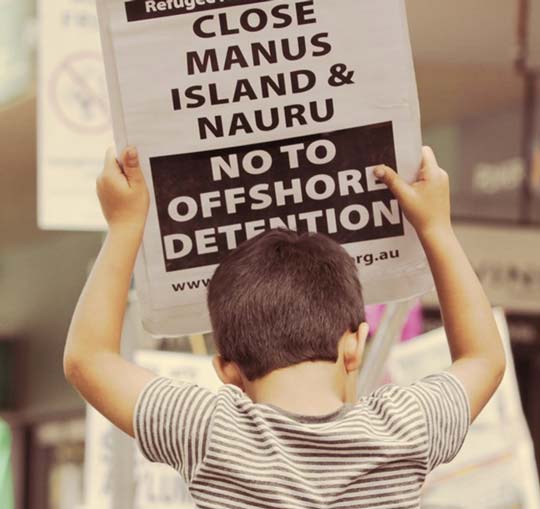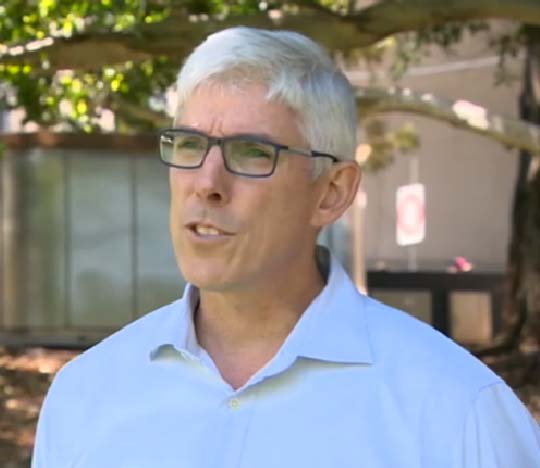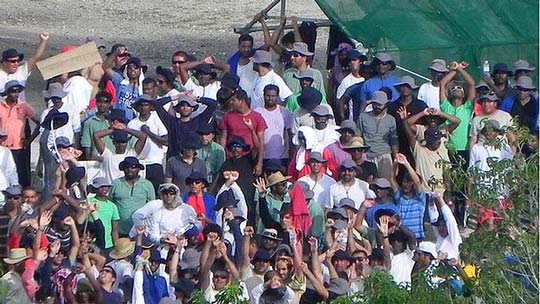
SYDNEY (Al Jazeera/Amnesty International/ Pacific Media Watch): Nauru's government has banned all journalists from reporting from the country in a move likely to heighten concern about refugees being held on the island state.
Last year, the Nauruan government said it was increasing the application fee for journalist visas from AUD$200 (US$145) to a non-refundable AUD$8000 (US$6000) per person.
But when Al Jazeera tried to apply, the network was told "all media application [sic] is not approved", Andrew Thomas reported.
For some months, Al Jazeera has been emailing and phoning Nauru about the official process for a correspondent and cameraman to apply to visit the country. Most email messages and phone calls went unanswered.
But last Wednesday, producer Alice Mulheron in the network's Sydney bureau was able to talk briefly to Darlene Dabana in Nauru's migration office.
She told Mulheron to ask employees to fill in a business visa form, and send her copies of passports. She said once those were received, she would send an invoice for AUD$8000 per person.
However, last Thursday morning, before those forms were completed and emailed to Nauru, Al Jazeera received an email saying, "media visa is not approved".
When Al Jazeera asked for clarification, the response from Dabana was, "I have been informed that all media application [sic] is not approved."
Inquiries
Al Jazeera then went on to inquire further, asking who or where the refusal came from, whether there was any point in submitting visa application forms, what circumstances a visa would be approved, and whether this means journalists - under all circumstances - would be banned from visiting Nauru.
That email has not been answered.
On Thursday, a phone call was answered, but an official immediately hung up.
On Friday, phone calls were being answered by voicemail, and messages were not returned.
The ban on journalists has come just days after foreign media reported on several allegations of rape of refugees on Nauru.
"It's interesting that Nauru would be so blatant. Clearly they won't allow anybody there to actually look for themselves and make an independent assessment about what's going on," said Graham Thom of Amnesty Australia.
"It's not surprising they won't let people go, but it is scary that Australia is funding an independent country to detain people, to house people, and won't allow any independent scrutiny of those centres," Thom added.
Thom said that if the centres were open, people should have been allowed to talk to journalists.
"It's frightening to think that journalists and others are being blocked, deliberately blocked, from going to Nauru.
"This is really telling when we're looking at the conditions currently for people on Nauru and the allegations we’re hearing, the mistreatment of women and treatment on Nauru."
Freedom of expression
The Pacific Freedom Forum said the ban was another “shocking” denial of human rights in the Pacific.
“Lift the ban now,” said PFF co-chair Titi Gabi.
“The government of Nauru is showing a shocking disregard for human rights within its own borders, with media scrutiny essential as a check and balance on abuse of power.”
As well as banning media, Nauru authorities ordered a police raid on the offices of Save The Children, a global group working towards children’s welfare.
“Whatever Nauru is trying to hide, it can’t be good if the authorities are so desperate to block all international media from visiting or reporting from the island,” said Meghna Abraham, deputy director for global thematic issues at Amnesty International.
Abuse allegations
“Amid allegations of ongoing abuse, including sexual assault, of asylum seekers held on Nauru at Australia’s behest, it is all the more vital that media are neither barred nor silenced from reporting the truth."
Abraham asked for the immediate allowance of media into Nauru and for authorities to repeal criminal sanctions that undermine the right to freedom of expression, as well as allowing independent human rights monitors access to the country.
The move to ban media fits into a broader crackdown on freedom of expression in Nauru.
Five Nauruan MPs remain suspended from Parliament for speaking to foreign media in the past. They have had their passports cancelled and are facing criminal charges.
In May, the Nauruan government blocked all access to Facebook for a number of weeks and passed new laws providing for imprisonment for up to seven years solely for exercising the right to freedom of expression.
Remove asylum seekers from Pacific detention centres plea
This work is licensed under a Creative Commons Attribution-NonCommercial 3.0 New Zealand Licence.




